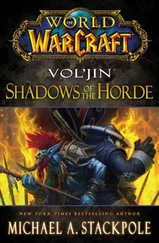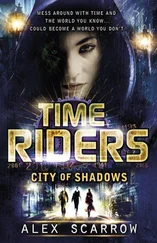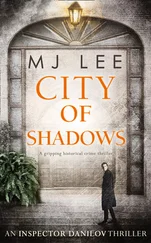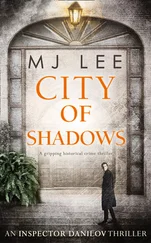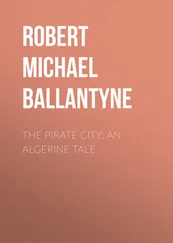Michael Russell - The City of Shadows
Здесь есть возможность читать онлайн «Michael Russell - The City of Shadows» — ознакомительный отрывок электронной книги совершенно бесплатно, а после прочтения отрывка купить полную версию. В некоторых случаях можно слушать аудио, скачать через торрент в формате fb2 и присутствует краткое содержание. Жанр: Исторический детектив, на английском языке. Описание произведения, (предисловие) а так же отзывы посетителей доступны на портале библиотеки ЛибКат.
- Название:The City of Shadows
- Автор:
- Жанр:
- Год:неизвестен
- ISBN:нет данных
- Рейтинг книги:5 / 5. Голосов: 1
-
Избранное:Добавить в избранное
- Отзывы:
-
Ваша оценка:
- 100
- 1
- 2
- 3
- 4
- 5
The City of Shadows: краткое содержание, описание и аннотация
Предлагаем к чтению аннотацию, описание, краткое содержание или предисловие (зависит от того, что написал сам автор книги «The City of Shadows»). Если вы не нашли необходимую информацию о книге — напишите в комментариях, мы постараемся отыскать её.
The City of Shadows — читать онлайн ознакомительный отрывок
Ниже представлен текст книги, разбитый по страницам. Система сохранения места последней прочитанной страницы, позволяет с удобством читать онлайн бесплатно книгу «The City of Shadows», без необходимости каждый раз заново искать на чём Вы остановились. Поставьте закладку, и сможете в любой момент перейти на страницу, на которой закончили чтение.
Интервал:
Закладка:
‘All we want to do is leave Danzig.’
‘I’m sure. Unfortunately, you’ll be shot while resisting arrest.’
Stefan glanced at Hannah. Her face was almost expressionless, but the tension in her body was enough to tell him that she wouldn’t stand there and be shot. They didn’t have much of a chance, but Hannah was ready to move. He nodded, hoping it was a signal she would understand. He was ready too.
‘You don’t need to do this, Kriminaloberassistent,’ he pleaded.
‘No, but it suits me to do it. And apart from anything else, you pissed me off, Irishman, in Weidengasse, in the mortuary.’ He stepped closer.
The big pine table that stood in the middle of the kitchen was between Stefan and Rothe. Stefan put his hands on the end of the table, leaning down and shaking his head, with an expression that made him seem utterly defeated.
‘I’m sorry, Hannah.’ He looked up. ‘There’s nothing we can do. Nuair a bhruim an tabla, ionsaigh an ceann eile.’ He spoke to her in Irish.
She smiled sadly and shrugged. ‘Ta me reidh.’
‘Words of fond farewell, that’s nice,’ said Rothe, smiling.
All at once Stefan pushed the table forward, with every bit of force he could find, driving it across the floor into the Gestapo man’s legs. It was a heavy table and it hit Klaus Rothe hard. It was still moving as he fell under it. At the same moment Hannah rushed forward and flung herself on top of Karl, knocking him to the ground. Rothe rolled out from under the table and leapt to his feet very fast. He was still holding the Mauser and he was grinning. It was a good try. He didn’t expect the pistol in Stefan’s hand, Hannah’s PKK. His surprise didn’t last any longer than it took Stefan to fire.
The Kriminaloberassistent was dead. In the doorway Hannah and Karl were still struggling. The bearded man lashed out and pushed her away. He scrambled to his feet and ran. Stefan hadn’t moved. He still had the PKK pointed at Rothe. Hannah got up and stepped over the body. ‘He’s dead. The other one isn’t!’ Stefan didn’t understand for a moment. It didn’t seem to matter. They were alive. She grabbed the pistol and raced to the door. ‘What are you doing?’ He ran after her into the hall. There was the sound of a car.
As Hannah reached the steps the black Mercedes was already heading down the drive, picking up speed. Stefan was there beside her now. ‘You won’t stop him.’ She stood quite still, holding the PKK in both her hands. The car was at the gate when she fired a single shot. The Mercedes carried on, straight on, out into the middle of Eschenweg, not turning to the right or the left. Then it halted; the man slumped over the wheel was dead too.
Stefan stared at Hannah. It was a shot he could never have made.
‘You’ve done that before.’
‘It was never a human being, just a target.’ She was still staring at the car. Then she turned, handing the PKK back to him, as if she didn’t want to touch it now.
‘What do we do, Stefan?’
‘We find anything that moves that’s leaving Danzig. If we needed to get out before, I’d say we’ve more than overstayed our welcome now.’
‘And Bishop O’Rourke?’
‘There is that,’ he smiled wryly. They were in this now, whether they wanted to be or not. They couldn’t just walk away with what they knew.
‘We can’t let it happen, can we?’
He shook his head. ‘No, we can’t. Keller’s got a phone.’
‘The phones aren’t safe, Stefan, none of them are.’
They needed to act. Stefan’s mind was racing.
‘Sean Lester’s the only one who can stop this.’
Hannah took his hand, pulling him down the steps.
‘I’ll go to the cathedral. You go to the High Commission.’
They ran down the steps and back out into Eschenweg, past the Mercedes in the middle of the road and the dead man slumped over the wheel, past the houses with red roofs and tidy gardens, past the apartment blocks where the swastikas hung from the windows, into Adolf-Hitler-Strasse. Hannah went one way and took the tram to Oliva; Stefan took the tram the other way, back into the city. There wasn’t really any choice.
At the mouth of the Tote Weichsel, where the river dissolved into the Baltic, there was a narrow spit of sand that became thinner and thinner until it disappeared into the sea itself. This was the Westerplatte. In high summer the beaches here were far less crowded than Zoppot’s. Here, scattered among the trees, were the concrete bunkers that represented Poland’s only military presence in Danzig. A hundred soldiers sat there for no very good reason, except that they could. When the League of Nations established the Free City it was a tiny concession to mollify Polish anger that the city they still claimed as part of Poland wasn’t Polish. The League saw the Polish flag flying over this windswept spit of sand as a gesture so modest as to be unimportant. The Poles saw the flag over the Westerplatte as proof that one day the city they called Gdan?sk would be Polish, whatever language was spoken in its streets. For the Germans of Danzig it had been an irrelevance to some and an irritation to others; an itch rather than a sore. But as the years went on and Hitler’s voice grew shriller in the city, the Polish fort and the Polish flag that flew over the Westerplatte had become an insult. It was a sore now. And if it could sometimes be ignored it could never be forgotten.
Stefan Gillespie sat in Sean Lester’s car, looking out at the Baltic. Behind them, among the trees, was the red and white Polish flag. On a day like this the Westerplatte was a wild place. The beaches were empty and there was only the low hum of the wind off the sea. They were a long way from the streets swathed in swastikas and the trucks of stormtroopers cheering for a democratic end to democracy. The High Commissioner had driven the car himself. He had no reason to believe his chauffeur was a spy but trust wasn’t something that could be taken for granted in the Free City any more. And here, today at least, there would be nobody to see them.
They had been silent for a while now. Lester was trying to make sense of what Stefan had told him. Some of it made no sense at all, but then he had only fragments of information. Where it did make sense it frightened him.
Another car drove towards them. The High Commissioner watched it approaching, still thoughtful. He got out of his own car and Stefan followed. The constant hum of the wind was louder. As the second car pulled up Stefan could see that the driver wore the uniform of the Schutzpolizei.
‘Oberleutnant Lange is the nearest thing to a policeman I can trust.’
‘You don’t sound very sure,’ said Stefan.
‘Trust can be bought and sold like everything else. Diplomacy isn’t really geared up for this. I remember some advice given to me by a British diplomat before I left Geneva: When deciding what to wear in the morning, bear in mind the day may bring unforeseen demands. Women should always keep a hat and gloves in the office for emergencies and men should keep a black tie in the desk for unexpected mourning. I don’t keep one in mine. Reinhold Lange is my best chance of not having to go home to get one.’
Oberleutnant Lange got out of his car and walked towards Stefan and the High Commissioner. Sean Lester shook the policeman’s hand warmly.
‘This is Herr Gillespie. I spoke to you about him before.’
‘You’re the detective sergeant?’
‘Yes, sir.’
‘And you’re here on some kind of holiday?’
‘Not exactly a holiday.’
‘I can see Irish understatement puts even English understatement into the shade,’ said Lange. He looked at Lester. ‘Do you know if the bishop is all right?’
‘He’s been told anyway. Fraulein Rosen went straight to the cathedral. And I have spoken to him now as well. The question is, who’s going to protect him?’
Читать дальшеИнтервал:
Закладка:
Похожие книги на «The City of Shadows»
Представляем Вашему вниманию похожие книги на «The City of Shadows» списком для выбора. Мы отобрали схожую по названию и смыслу литературу в надежде предоставить читателям больше вариантов отыскать новые, интересные, ещё непрочитанные произведения.
Обсуждение, отзывы о книге «The City of Shadows» и просто собственные мнения читателей. Оставьте ваши комментарии, напишите, что Вы думаете о произведении, его смысле или главных героях. Укажите что конкретно понравилось, а что нет, и почему Вы так считаете.

